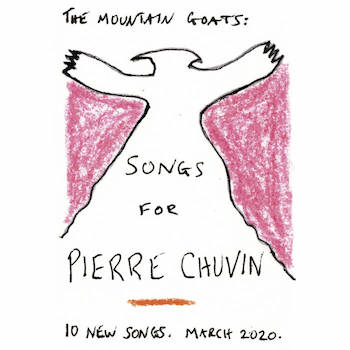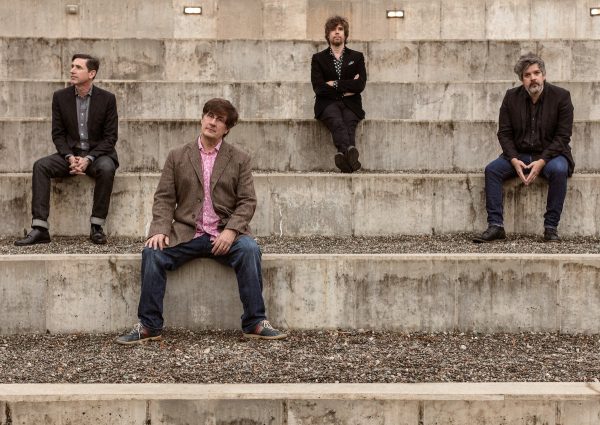Rock Album Review: The Mountain Goats — In Praise of Loss
By Alex Szeptycki
An admiration for certain defeat permeates much of The Mountain Goats’ album Songs for Pierre Chuvin.

Songs for Pierre Chuvin, the latest offering from The Mountain Goats, will no doubt be one of many albums inspired by COVID-19. The virus forced lead singer Darnielle out of the studio, sending him back home to reconnect with his lo-fi origins. Consisting of little more than the singer/songwriter’s voice and guitar, the recording represents a return to the stripped-down aesthetic that defined his earliest work with The Mountain Goats. A threat from the outside brought Darnielle back to the roots of his sound.
Thankfully, the plague triggered an artful response. While there isn’t much music here (only 27 minutes), the material contains almost no filler. The threadbare instrumentation highlights Darnielle’s talent for storytelling, as he weaves together strange, fatalistic tales about the last days of paganism. His high pitched, manic voice drives these yarns forward, imbuing them with a peculiar forlorn energy. Despite (or because of) the music’s rough edges, these narratives of hope — inevitably tempered by impending doom — make for an oddly topical and emotionally satisfying listen.
Darnielle emphasizes the ragged, DIY aesthetics of Songs for Pierre Chuvin. In the few videos he posted on YouTube you can see him recording on a BoomBox, a technique he used to make his earliest albums. The result is the predominance of a sonic fuzz. The guitar sound is crackly and distorted; Darnielle’s voice sounds distant. It is an austerity that other musicians have taken up many times before. It is well done here. The audio crackle is never overpowering, and the voice is not so distant as to be inaudible. At times, Darnielle will begin a track quietly musing to himself. He’ll announce the name of the song, or joke about what key he’s in. It’s a small touch that adds some quirky personality. This homey, intimate quality provides an apt platform for the album’s compelling lyrics.
In fact, Darnielle’s talent for writing lyrics proves to be the driving force of Songs for Pierre Chuvin. On previous albums, he’s delved into exploring subcultures and communities full of outcasts, misfits, and other strange people; he’s also written about goths and professional wrestlers. This time the topic of exotic choice is paganism. He examines the fall of the worship of nature, looking at various sects who were hunted down by Christians during the period of the Roman Empire. Darnielle’s words are hopeful about history’s victims, even though they are ultimately doomed. “Last Gasp at Calama” sums up his attitude. It centers on a group of pagans who throw a religious festival even though it has been outlawed. About this joyous, yet ill-fated act of resistance Darnielle sings, “One more summer, then all of this is gone.” These people know that they and their beliefs won’t last long — they choose to enjoy the time they have left.
This admiration for certain defeat permeates much of the album. The second track, “Until Olympius Returns,” tells the story of a group of pagans who are forced to go into hiding after their leader, Olympius, flees to escape persecution. They are determined to maintain their rebel camp until he returns. “This is just a brief improvisation in the dance,” Darnielle cries over a punchy guitar riff as they celebrate their defiance. But a note posted with the song adds a level of tragic irony, informing us that Olympius was never heard from again. In “January 31st 438” Darnielle sings about pagan arrests with an obvious admiration for fatalism; “If they come catch me, and arrest me mid-step/Let me go down dancing, let me be the last one left.” These people know that there is little to hope for, but that will not stop their longing for happiness. This mix of the celebratory and the disastrous makes the simplicity of the Songs for Pierre Chuvin gratifyingly complex. The music feels deep and lived in.
At times, Darnielle is a delightfully inventive storyteller. In “For the Snakes,” he writes from the perspective of the title beast, who was awarded religious significance by some pagan sects. The critter slithers through the ruins of a pagan temple. Elsewhere, in “The Wooded Hills Along the Black Sea,” Darnielle journeys through the earth itself, winding his way through the thick woods and craggy shores where the pagans lay in hiding.

The Mountain Goats
The few dull moments in the album occur when Darnielle tamps down his instrumental energy as well as the pitch of his voice. In the mournful dirge “The Gods Do Not Have Surgeons” he sings about the destruction of pagan temples. His repeated intonations of “Restore the Temple of Isis at Memphis” become boringly ritualistic, more of a slogan than a convincing expression of convictions. “Going To Lebanon 2” also suffers from a drop-off in musical intensity. The story line deals with exile and forced migration: “Take note of what will be gone in the blink of an eye.” The slow, limping guitar that underpins the song’s melancholy lines is languid to a fault.
The final track, “Exegetic Chains,” brings the bleak exuberance of Darnielle’s pagans to the present day. It is a lament about feeling trapped and powerless, a sentiment that resonates powerfully with the global crisis at hand. He sings affectionately of “The Panasonic hum” of his old BoomBox, mourning its coming demise but seeking to move forward. The chorus, paraphrased from perhaps his most successful song, “This Year,” embodies this sentiment: “Make it through this year/If it kills you outright.” This short line embodies the spirit of Songs for Pierre Chuvin: it is about finding reasons for exultation, even in the face of certain catastrophe. And it is this vision that provides a key to the album’s catharsis. We, like the pagans, are struggling to find joy in the face of threatening hardship.
Alex Szeptycki is a student from Charlottesville, Virginia, currently studying at Stanford University. He is majoring in American Studies, with a focus in Contemporary Art and Media. He is currently finishing up his senior year, before looking to pursue a career in writing or the arts.
